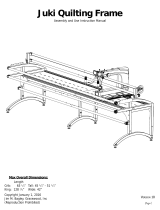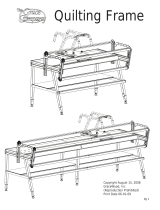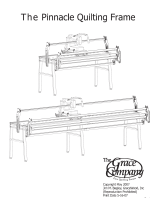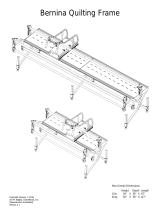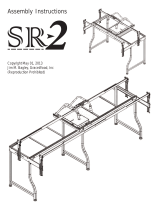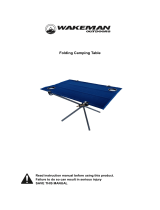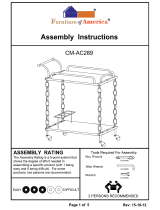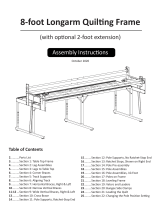Page is loading ...

1
The Phoenix
Professional Quilting Frame
Copyright January 1, 2016
Jim M. Bagley, GraceWood, Inc
(Reproduction Prohibited)
Version 2.1

2
The Phoenix
Professional Quilting Frame
Parts List
Box 1.........................................................................................................3
Box 2.........................................................................................................4
Box 3.........................................................................................................5
Hardware...................................................................................................5
Tools..........................................................................................................5
Assembly Steps
Step 1 - Height Adjustable Leg Assembly......................................................6
Step 2 - Table Top To Side...........................................................................6
Step 3 - Attach Middle Leg Assembly............................................................6
Step 4 - Connect Front Bar..........................................................................7
Step 5 - Attach Support Plates.....................................................................7
Step 6 - Attach Front Rail Support................................................................7
Step 7 - Bungee Adjustment........................................................................8
Step 8 - Gearbox and Shaft Assembly...........................................................8
Step 9 - Track Support Assembly..................................................................9
Step 10 - Track Insertion.............................................................................9
Step 11 - Track Support Installation..............................................................9
Step 12 - Track Alignment..........................................................................10
Step 13 - Plastic Table Installation...............................................................10
Step 14 - Rail End Cap Assembly.................................................................11
Step 15 - Rail Connection...........................................................................11
Step 16 - Rail Installation...........................................................................12
Step 17 - Top Carriage Alignment...............................................................13
Step 18 - Machine Attachment....................................................................13
Fabric Installation
Fabric Installation Over View.......................................................................14
Leader Cloth Installation Instructions...........................................................14
Installing Fabric Onto Rails..........................................................................14
Step 1 - Quilt Backing to 2nd rail.................................................................15
Step 2 - Quilt top to 3rd rail........................................................................15
Step 3 - Batting.........................................................................................16
Step 4 - Attaching Quilt Fabric To Take Up Rail.............................................16
Rolling Quilt Fabric.....................................................................................16
Bungee Clamp Installation..........................................................................16
Leader Cloth Instructions............................................................................17

3
Parts List
Middle Leg
Assembly (1)
Right Side
Assembly (1)
Box 1
Left Front
Rail Support
Assembly (1)
Right Front
Rail Support
Assembly(1)
Rail End
Cap (7)
Ratchet (3)
Take Up Rail
Wheel Assembly (1)
Wheel
Knob (2)
Left Side
Assembly (1)
Right Gearbox
Assembly (1)
Left Gearbox
Assembly (1)
Bungee Clamps (4)

4
Box 2
Frame Table (2)
Plastic Table (2)
Track Support (4)
Plastic Track
12 ft. (4)
Track Support
Coupler(2)
Plastic Track
6 ft. (4)
Side Support
Plate (4)
Front Support
Plate (1)
Back Support
Plate (1)

5
Hardware (in Box 1)
Tools
Hardware Parts List
***Drawings display hardware in actual size***
Pole List
(3) 57-11/16" Aluminum Pole
(3) 36" Aluminum Pole
(3) 105" Fabrifast Tubing
(8) 5/16 X 2"
Carriage Bolt
(4) 5/16 X 1-1/2"
Hex Bolt
(2) 1/4" X 45mm
Connector Bolt
(4) 1/4" X 60mm
Connector Bolt
(4) 5/16 Plastic
Knob
(3) 1/4 X 1-1/2"
Truss Bolt
(4) 1-1/4"
Fender Washer
(8) 5/16" Flat
Washer
(8) 1/4" Flat
Washer
(6) 1/4"
Rectangle Nut
(8) 5/16" Jamb
Nut
(4) 5/16"
Nylock Nut
(8) Plastic
Roller
(1) 4mm Allen
Wrench
(3) 14" Aluminum Pole
(18) 10-24 Socket
Head Screw
(6) Aluminum
Rail Coupler
(1) Fabrifast
Tool
(6) #10 Square
Nut
(1) 3mm Allen
Wrench
M3 Allen
Wrench (1)
Hardware Parts List
***Drawings display hardware in actual size***
Pole List
(3) 57-11/16" Aluminum Pole
(3) 36" Aluminum Pole
(3) 105" Fabrifast Tubing
(8) 5/16 X 2"
Carriage Bolt
(4) 5/16 X 1-1/2"
Hex Bolt
(2) 1/4" X 45mm
Connector Bolt
(4) 1/4" X 60mm
Connector Bolt
(4) 5/16 Plastic
Knob
(3) 1/4 X 1-1/2"
Truss Bolt
(4) 1-1/4"
Fender Washer
(8) 5/16" Flat
Washer
(8) 1/4" Flat
Washer
(6) 1/4"
Rectangle Nut
(8) 5/16" Jamb
Nut
(4) 5/16"
Nylock Nut
(8) Plastic
Roller
(1) 4mm Allen
Wrench
(3) 14" Aluminum Pole
(18) 10-24 Socket
Head Screw
(6) Aluminum
Rail Coupler
(1) Fabrifast
Tool
(6) #10 Square
Nut
(1) 3mm Allen
Wrench
M5 Allen
Wrench (1)
10mm and 13mm Wrench (1)
Bottom Carriage (1)
Fabric Rail (8)
Rail Coupler (4)
Top Carriage (1)
Hardware Parts List
***Drawings display hardware in actual size***
Pole List
(3) 57-11/16" Aluminum Pole
(3) 36" Aluminum Pole
(3) 105" Fabrifast Tubing
(8) 5/16 X 2"
Carriage Bolt
(4) 5/16 X 1-1/2"
Hex Bolt
(2) 1/4" X 45mm
Connector Bolt
(4) 1/4" X 60mm
Connector Bolt
(4) 5/16 Plastic
Knob
(3) 1/4 X 1-1/2"
Truss Bolt
(4) 1-1/4"
Fender Washer
(8) 5/16" Flat
Washer
(8) 1/4" Flat
Washer
(6) 1/4"
Rectangle Nut
(8) 5/16" Jamb
Nut
(4) 5/16"
Nylock Nut
(8) Plastic
Roller
(1) 4mm Allen
Wrench
(3) 14" Aluminum Pole
(18) 10-24 Socket
Head Screw
(6) Aluminum
Rail Coupler
(1) Fabrifast
Tool
(6) #10 Square
Nut
(1) 3mm Allen
Wrench
Hardware Parts List
***Drawings display hardware in actual size***
Pole List
(3) 57-11/16" Aluminum Pole
(3) 36" Aluminum Pole
(3) 105" Fabrifast Tubing
(8) 5/16 X 2"
Carriage Bolt
(4) 5/16 X 1-1/2"
Hex Bolt
(2) 1/4" X 45mm
Connector Bolt
(4) 1/4" X 60mm
Connector Bolt
(4) 5/16 Plastic
Knob
(3) 1/4 X 1-1/2"
Truss Bolt
(4) 1-1/4"
Fender Washer
(8) 5/16" Flat
Washer
(8) 1/4" Flat
Washer
(6) 1/4"
Rectangle Nut
(8) 5/16" Jamb
Nut
(4) 5/16"
Nylock Nut
(8) Plastic
Roller
(1) 4mm Allen
Wrench
(3) 14" Aluminum Pole
(18) 10-24 Socket
Head Screw
(6) Aluminum
Rail Coupler
(1) Fabrifast
Tool
(6) #10 Square
Nut
(1) 3mm Allen
Wrench
M4 Allen
Wrench (1)
M6 Allen
Wrench (1)
M8 X 16 mm
Socket Head Screw (50)
M6 X 10 mm
Connector Bolt (16)
M6 X 16 mm
Set Screws (8)
Box 3
Front Bar (2)
Shaft (1)
Shaft
Coupler(2)
Box 4
M8 Jam Nut (2)
M8 Eye Bolt (2)
Bungee Stop (4)

6
Step 1 - Height Adjustable Leg Assembly
Parts Needed:
1 - Right Side Assembly
1 - Left Side Assembly
1 - Middle Leg Assembly * (for King Size)
1-1: To adjust the height of the leg, remove the
pre-assembled M8 X 50 mm Pins and loosen the
M8 X 16 mm Socket Head Screw, as shown in Fig.
1.1. Reinsert the M8 X 50 mm Pins into the leg
at desired height. Then tighten the M8 X 16 mm
Socket Head Screw.
Step 2 - Table Top to Side
Parts Needed:
4 - M8 X 16 mm Socket Head Screw
1 - Right Side Assembly
1 - Left Side Assembly
2 - Frame Table* ( 1 Frame Top for Crib Size)
2-1: Lay Side Assemblies on their side, as shown in
Fig. 2.1. Slide the Frame Table in the brackets. Then
use (2) M8 X 16 mm Socket Head Screws to connect
the Right Side Assembly to the Frame Table. Make
sure the side of the Frame Table with the holes is
touching the oor, as shown in Fig. 2.1.
2-2: Repeat Step 2-1 for the Left Side
Assembly, using same Frame Table for
the Crib Size and the second Frame Table
for the King Size.
Fig. 1.1
Fig. 2.1
M8 X 16 mm
Socket Head Screw
M8 X 16 mm
Socket Head Screw
M8 X 50 mm
Pin
1-2: Repeat Step 1-1 for all other legs.
Holes
Step 3 - Attach Middle Assembly*
(For King Size only)
Parts Needed:
4 - M8 X 16 mm Socket Head Screw
1 - Right Side Assembly with Frame Table
1 - Left Side Assembly with Frame Table
1 - Middle Assembly
3-1: With your Left and Right Side
Assemblies still on their sides, place the
Middle Leg Assembly at the joint and attach
it to the Frame Tables with (4) M8 X 16 mm
Socket Head Screws, as shown in Fig. 3.1.
Fig. 3.1
M8 X 16 mm
Socket Head Screw

7
4-1: With someone’s help,tilt
the Table into a standing position.
Now place (2) Front Bars at the
front of the frame with the slotted
holes on top, and attach to the frame using (4) M8 Socket Head Screws, as shown in Fig. 4.1.
Note: For Crib attach one Front Bar to both sides and not the middle.
Figure 4.1
Step 4 - Connect Front Bar
Parts Needed:
4 - M8 X 16 mm Socket Head Screw*
2 - Front Bar*
*(2 Screws and 1 Front
Bar for Crib Size)
M8 X 16 mm
Socket Head
Screw
Step 5 - Attach Support Plates
Parts Needed:
26 - M8 X 16 mm Socket Head Screw*
4 - Side Support Plate
1 - Back Support Plate*
1 - Front Support Plate*
*(no Back or Front Support Plate and
only 16 Screws in Crib Size, skip Step 5-2, for Crib Size)
5-1: Attach (4) Side Support Plates to the corners of the frame
using (16) M8 X 16 mm Socket Head Screws, as shown in Figure 5.1.
5-2: Attach the Back Support Plate to the back of the Middle Leg
Assembly of the frame in the back using (6) M8 X 16 mm Socket Head Screws. Attach the Front
Support Plate to the front using (4) M8 X 16 mm Socket Head Screws.
Fig. 5.1
M8 X 16 mm
Socket Head
Screws
Step 6 - Attach Front Rail Support
Parts Needed:
8 - M8 X 16 mm Socket Head Screw
2 - M8 Eye Bolt
2 - M8 Jam Nut
1 - Right Front Rail Support Assembly
1 - Left Front Rail Support Assembly
6-1: Using (4) M8 X 16 mm Socket Head Screws attach
the Right Front Rail Support Assembly to the right front
corner of the frame using the corresponding hole for your
machine as shown in Fig. 6.1 for the Ansley 26” putting
an M8 Eye Bolt and an M8 Jam Nut behind the Right Front Rail Support Assembly or Fig. 6.2 for the
Tin Lizzie 18” replacing (1) M8 X 16 mm Socket Head Screw with an M8 Eye Bolt and an M8 Jam Nut.
6-2: Repeat Step 6-1 for Left Front Rail Support Assembly.
M8 X 16 mm
Socket Head Screws
M8 X 16 mm
Socket Head Screws
M8 Eye Bolt
M8 Eye Bolt
M8 Jam Nut
M8 Jam Nut
Fig. 6.1 Ansley 26 Fig. 6.2 Tin Lizzie 18

8
Step 7 - Bungee Adjustment*
(only for Ansley 26” Sewing Machine)
7-1: For an Ansley Machine unscrew the (4) M8 X
16 mm Socket Head Screws holding the (2) Bungee
Tubes in place.
7-2: Move both Bungee Tubes closer to the front
of the frame and reattach the (4) M8 X 16 mm
Socket Head Screws as shown in Fig. 7.1.
M8 X 16 mm
Socket Head Screws
Fig. 7.1
Bungee Tube
Step 8 - Gearbox and Shaft Assembly
Parts Needed:
1 - Shaft*
2 - Shaft Coupler*
1 - Right Gearbox Assembly
1 - Left Gearbox Assembly
4 - M8 X 16 mm Socket Head Screw
*(The Shaft and (1) Shaft Coupler are not used
in Crib Size. Skip steps 8-2 and 8-3 for
Crib Size.)
Fig. 8.1
8-1: Attach the Right Gearbox Assembly to the right
side of frame by tightening (2) M8 X 16 mm Socket Head
Screws into the Frame Side, as shown in Figure 8.1.
8-2: Place the Shaft through the plastic hole in the
center of the frame, as shown in Figure 8.2.
8-3: Connect the shafts together with a Shaft Coupler
tightening until they are touching and then lock them down using (4)
M6 X 16 Set Screws, as shown in Fig. 8.4.
Fig. 8.2
Fig. 8.4
8-4: Put the Left Gearbox Assembly on the left side of the frame rst
by placing a Shaft Coupler in between the shafts and lining them up,
as shown in Fig. 8.4.
8-5: Thread (2) M8 X 12 mm Socket Head Screws through
the Left Gearbox Assembly and completely tighten them.
8-6: Tighten the M6 X 16 mm Set Screws in the Shaft Coupler and left shaft.
8-7: Screw Wheel Knobs onto each Gearbox Wheel, as shown in Fig. 8.3.
M8 X 12 mm
Hex Bolts
Right
Gearbox
Assembly
Shaft
Plastic Hole
M6 X 16 mm
Set Screws
Fig. 8.3

9
Fig. 9.1
Fig. 10.1
Step 9 - Track Support Assembly*
(For King Size only)
Parts Needed:
8 - M6 X 16 mm Set Screw
4 - Track Support
2 - Track Support Coupler
9-1: Slide half of a Track Support Coupler into a Track Support and lock the Coupler in place
by using (2) M6 X 16 mm Set Screws.
9-2: Side another Track Support over the rest of the Track Support Coupler and then lock
the Coupler in place by using M6 X 16 mm Set Screws, as shown in Fig. 9.1.
9-3: Repeat Steps 1 and 2 to create another Track Support Assembly.
Step 10 - Track Insertion
Parts Needed:
2 - Track Support Assembly
4 - Plastic Track* (for King Size)
4 - 6 ft. Plastic Track* (for Crib Size)
10-1: Slide (2) Plastic Track into the groves of the Track Support
Assembly, as shown in Figure 10.1.
10-2: Repeat Step 10-1 for remaining Track Support Assembly.
Fig. 11.1
Step 11 - Track Installation
Parts Needed:
2 - Track Support Assembly
16 - M6 X 10 mm Connector Bolt*
*(only 8 Connector Bolts for Crib Size)
11-1: Lay one of the Track Support
Assemblies on the front and one on the back
of your frame.
11-2: Screw M6 X 10 mm Connector Bolt
into each of the holes, as shown in Figure
11.1, do not to completely tighten the bolts
at this time.
Track Support
Assembly
M6 X 10 mm
Connector Bolt
Track Support
Assembly
Plastic
Track
Track Support
Coupler
Track
Support
M6 X 16 mm
Set Screws

10
Fig. 12.1
Step 12 - Track Alignment
Parts Needed:
1 - Bottom Carriage
12-1: Place the Bottom Carriage on
the tracks and slide it across the frame,
adjust the tracks so they line up with
the wheels and the Bottom Carriage,
as shown in Fig. 12.1. This allows your
carriage to glide smoothly across the
frame during quilting.
12-2: Once the track is lined up,
tighten the M6 X 10 mm Connector
Bolts under the track until they are
tight and the track can not be moved.
Remove the Bottom Carriage until later.
Fig. 13.1
Step 13 - Plastic Table Installation
Parts Needed:
2 - Plastic Table*
*(Only (1) Plastic Table is needed
for Crib Size)
13-1: Lay the Plastic Table against the back Track Support and against one side of the frame,
over the foam strips, as shown in Fig. 13.1.
13-2: Lay the other Table against the back Track Support and against the other side of the
frame.
Plastic Tables
Bottom Carriage

11
14-1: Slide (3) Ratchets on (3) Fabric Rails, matching the ridges in the Ratchet with the groves in the
Fabric Rail. Rail End Caps come assembled. Steps 14-2, 14-3 and 14-5 are for changing to Crib or King
after frame has been assembled and can otherwise be skipped.
Note: If a Rail End Cap is disassembled place the M8 Nut into the back of the Conduit Cap and slide
the M8 X 70 mm Socket Head Screw through an M8 Washer, M8 X 38 mm Plastic Spacer, another M8
Washer, and Conduit Cap, then lightly tighten the screw into the M8 Nut, as shown in Fig. 14.1.
14-2: Slide (6) Rail End Caps into the ends of
(2) Fabric Rails with Ratchets and (5) Fabric Rails
without Ratchets. Tighten the Socket Head Screws.
Note: If the Take Up Rail Wheel Assembly is
disassembled, make the Take Up Rail Wheel Assembly by using
the M8 X 90 mm Slotted Socket Head Screw followed by the Wheel Assembly, M8 Washer, M8 X 38 mm
Steel Spacer, another M8 Washer, and Conduit Cap with the M8 Nut placed in back, as shown in Fig.
14.2. Firmly tighten the Assembly and place it into the last Rail with the Ratchet, nish by tightening
the M8 X 90 mm Slotted Socket Head Screw.
Step 14 - Rail End Cap Assembly
Parts Needed:
8 - Fabric Rail*
7 - Rail End Cap
3 - Ratchet
1 - Take Up Rail Wheel Assembly
*(Only use (4) Fabric Rails for Crib Size)
Note: For Crib size make one Rail with only Rail End Caps on each side (with steel Spacers), two with
only a Rail End Cap on one side and a Rail End Cap with a Ratchet on the other, and one Rail with a
Rail End Cap on one side and the Take Up Rail Wheel Assembly with a Ratchet on the other side.
Fig. 14.1
Fig. 14.2
Fabric Rail
Conduit Cap
Ratchet
M8 X 38 mm
Plastic Spacer
M8 Washers
M8 Nut
M8 X 70 mm
Socket Head
Screw
M8 X 90 mm Slotted
Socket Head Screw
Take Up Rail
Wheel Assembly
Conduit Cap
Wedge
Batting Rail (1)
Top Fabric and Backing Rails (2)
Take Up Rail (1)
Rail End Caps with
Steel Spacers
Rail End Caps with
Steel Spacers
Rail End Caps with
Plastic Spacers
Rail End Caps with
Plastic Spacers
Ratchet
Take Up Rail
Wheel Assembly
Ratchet

12
Fig. 15.1
Step 15 - Rail Connection*
(For King Size only)
Parts Needed:
1 - Fabric Rail Assembly with Hand Wheel
5 - Fabric Rail Assembly without Ratchet
2 - Fabric Rail Assembly with Ratchet
4 - Rail Coupler
16 - M8 X 16 mm Set Screw
15-1: Slide a Rail Coupler into the open end of a Fabric Rail Assembly with a Ratchet and line the holes
up. Use (2) M6 X 16 mm Set Screws to tighten the Rail to the Coupler, as shown in Fig. 15.1.
15-2: Slide a Fabric Rail Assembly without a Ratchet on the other end of the coupler. Again line up the
holes and tighten (2) M6 X 16 mm Set Screws into the Coupler through the Rail.
15-3: Repeat Steps 15-1 and 15-2 until you have three Fabric Rail Assemblies and then make the
fourth assembly using (2) Fabric Rail Assemblies without Ratchets and Steel Spacers for the Batting Rail.
M6 X 16 mm
Set Screws
Rail Coupler
Rails
Batting Rail (1)
Take Up Rail (1)
Rail End Caps with
Steel Spacers
Rail End Caps with
Steel Spacers
Rail End Caps with
Plastic Spacers
Ratchet
Rail End Caps with
Plastic Spacers
Ratchet
Take Up Rail
Wheel Assembly
Top Fabric and Backing Rails (2)

13
Fig. 16.1
Step 16 - Rail Installation
Parts Needed:
1 - Fabric Rail Assembly without Ratchet
2 - Fabric Rail Assembly with Ratchet
1 - Fabric Rail Assembly with Hand Wheel
16-1: Place the Fabric Rail without Ratchet into
the rail holder on the bottom of the frame for the
batting rail, as shown in Fig. 16.1.
16-2: The (2) Fabric Rail Assembly with Ratchet go on the
rail holders on the front of the frame with the ratchets going
on the right side of the frame, as shown in Fig. 16.2.
16-3: The Fabric Rail Assembly with Hand Wheel goes in the rail holders on the top back
of the frame with the hand wheel on the right side of the frame.
16-3: Spin the Rails, as shown in Fig. 16.2, to make sure the ratchets are working.
Fig. 16.2
Take Up Rail
Quilt Top
Rail
Batting Rail
Quilt Backing
Rail

14
Congratulations! You have completed the assembly of your Quilting Frame.
All that remains is to install your fabric and begin quilting!
We recommend you begin with practice material allowing you to experiment with machine settings
and stitching techniques.
NOTE: As you cut the fabric layers, we recommend making the quilt backing about 6-8” longer
and 2-4” wider than the top. This will allow for a little give in the backing, especially if using
thicker batting.
Step 17 - Top Carriage Alignment
Parts Needed:
1 - Top Carriage
1 - Bottom Carriage
Step 18 - Machine Attachment
Parts Needed:
1 - Top Carriage
1 - Tin Lizzie Quilting Machine
17-1: Place the Top Carriage on the Bottom
Carriage and loosen the M8 X 16 mm Socket
Head Screws on the Top Carriage.
17-2: Line up the wheels so all (8)
wheels are touching the track as it
slides, as shown in Fig. 17.1.
17-3: Retighten all (8) M8 X 16 mm
Socket Head Screws.
17-4: Place both the Bottom and Top Carriages
on the frame.
18-1: Loosen the M8 X 16 mm Socket Head
Screws on the Top Carriage, as shown is Fig. 18.1,
and center your machine side to side over the Top
Carriage and set the machine down on the
Top Carriage.
18-2: For the 26 inch machine move Top
Carriage to the back of the Bottom Carriage and
adjust the machine so the needle is about 1/4 inch
in front of the Take Up Rail. For the 18 inch
machine make sure the machine is centered so the
needle can be in any point between the Rails.
Fig. 17.1
Fig. 18.1
M8 X 16 mm
Socket Head
Screws
18-3: Retighten the M8 X 16 mm Socket Head Screws on the Top Carriage.
18-4: Check if wheels are touching. If not loosen M8 X 16 mm Socket Head Screws from Step 17-1,
move until wheels are aligned and retighten M8 X 16 mm Socket Head Screws.
M8 X 16 mm
Socket Head
Screws
Top Carriage
Bottom Carriage

15
Using leader cloths enable you to nish your quilt completely, end to the end, without having
to take your quilt off the frame.
Fabric Installation:
Step 1: Install quilt top to 2nd rail and roll up.
Step 2: Install quilt backing to the 3rd rail and roll up.
Step 3: Install batting to the 4th rail and roll up.
Step 4: Attach quilt backing to take up rail.
Step 5: Attach batting to take up rail.
Step 6: Attach quilt top to take up rail.
Fabric Installation Overview
top fabric
(Step 1)
take up leader
backing (Step 2)
batting (Step 3)
4th rail
3rd rail
2nd rail
1st rail (take up rail)
backing
top fabric
batting
4th rail
3rd rail
2nd rail
1st rail
Fig. FI-1
Fig. FI-2
Leader Cloth Installation Instructions
Preview
Step L1: Draw a straight line all the way across
each of your fabric rails with a black magic
marker.
Step L2: Mark the center of each cloth leader
on both edges (Length-wise). Also place a mark
at the center of each of the fabric rails. Always
measure to the center of the rails from the same
end of the quilting frame. Draw the lines at the
center of each rail so that they cross the lines
previously drawn across the rails.
Step L3: Now you need to attach your leaders
to their respective rails. The fabric can easily
be attached to the rails by applying a piece of
adhesive backed hook Velcro along the lines that
you have drawn down each fabric rail.
Fig. FI-3
4th
3rd
2nd
1st
top fabric
leader
backing
leader
take up
leader
Note: This illustration
shows the cloth leaders
installed on each rail
prior to your quilt layers
being installed.

16
Installing Fabric Layers Onto Rails
STEP 1: Quilt Top To 2nd Rail
Step 1-1: Determine which will be the front and back
edges of your quilt.
Step 1-2: Line up the center of your fabric layer with the
center of the cloth leader on the 2nd Rail. Pin the back
edge of your top to the leader cloth. This is to be done
with the nished side of the fabric facing up.
Step 1-3: Do not stretch or pull the fabric during this
process. Let it lay as naturally as possible.
Step 1-4: Roll your leader and top onto the 2nd rail
completely. Again, be sure the fabrics stay lined up.
Smooth out any wrinkles as you roll by brushing the fabric
from the center out, being very careful not to stretch or
pull the fabric excessively.
NOTE! It is important that you roll the rail the proper
direction so the fabric rolls onto the 2nd rail the right way
(when fabric rolls off the rail toward the take-up rail, it
should roll under and off the rail. See Fig. FI-4).
Fig. FI-4
backing
take up
leader
1st
2nd
3rd
4th
batting
top fabric
top fabric
1st
2nd
3rd
4th
Fig. FI-5
STEP 2: Quilt Backing To 3rd Rail
Step 2-1: To begin, determine which will be the front and back
edges of your quilt backing (make sure the backing is not
wider than your quilting frame).
Note: If your backing is made up of more than one piece of
fabric, cut your selvedges off and atten them out to allow the
backing the proper give it needs.
Step 2-2: Line up the center of your fabric layer with the
center of the cloth leader on the 3rd rail. Pin the back edge of
your backing to the leader cloth. This is to be done with the
nished side of the fabric facing down.
Note: Do not stretch or pull the fabric during this process, let it
lay as naturally as possible.
Step 2-3: Roll your leader and backing onto the 3rd rail
completely. Watch to make sure the fabric stays lined up.
Smooth out any wrinkles as you roll by brushing the fabric from
the center out. However, be very careful not to stretch or pull
the fabric excessively.
Note: It is important that you roll the rail the proper direction
so the fabric rolls over and onto the 3rd rail (Fig. FI-4).
batting
1st
2nd
3rd
4th
Fig. FI-6

17
quilt top
1st
2nd
3rd
4th
batting
backing
Fig. FI-7
Rolling Your Fabric
When you have completed your work area and are ready to move to the next, simply release the
ratchet stops on the 2nd and 3rd rails, allowing them to roll freely. Then, roll the 1st rail forward,
rolling the completed work area onto that rail.
TIP! As you roll forward, the quilt will accumulate on the 1st rail. Be sure to raise the take up rail
brackets slightly as needed, so that the bottom of the rolled up fabric stays about 1/8” above the
throat plate of your sewing machine base. Failing to do so will cause your carriage assembly
to roll less smoothly.
STEP 3: Batting
Step 3-1: A light, bonded batting is recommended.
Step 3-2: Center the batting on the 4th rail. Roll the batting
onto the 4th rail, being sure to roll the proper direction so that
it, like the quilt top, comes off the rail from the bottom when
unrolling.
STEP 4: Attaching Your Quilt Layers To The Take-Up Rail
Step 4-1: Take the edge of the quilt backing and pin it along
the straight line of the take up rail leader in a smooth manner,
without stretching your fabric.
Step 4-2: Next, bring your batting up in between the 3rd rail and 2nd rail and drape over the
backing. Lay it along the pin line of your backing on the take up rail cloth leader.
Step 4-3: Finally, bring the quilt top up over the backing and batting and lay it over the batting
along the pin line on the take up rail cloth leader. Pin your top and batting along the same line as
your backing so that it is smooth.
Bungee Clamp Installation
There are four Bungee Clamps
provided with your Quilting Frame.
The Bungee Clamps allow you to
easily add side tension to your quilt
fabric. Clip your bungee Clamps to
the quilt fabric, then insert the loose
end of the Bungee Cord through the
Bungee Tube and pull it to the side
Bungee Stop on to lock it into place,
as shown in Fig. BC1-1.
Fig. BC1-1
Bungee Clamp
Cord Stop
Bungee Bar
Bungee Cord
Fabric

18
/

